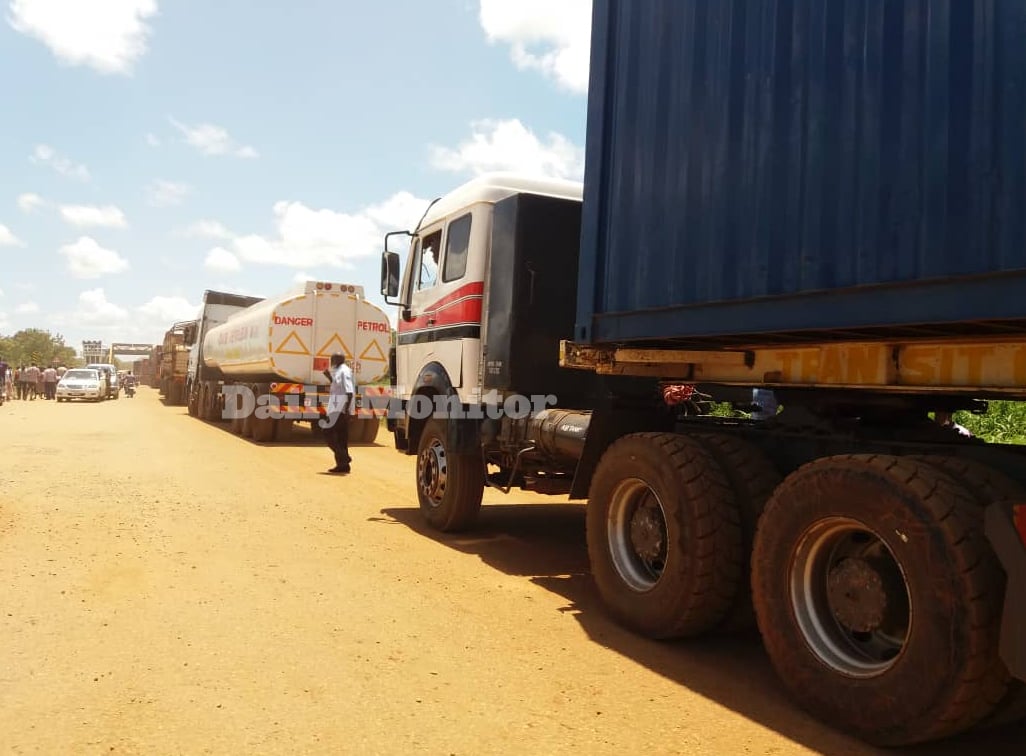Truck drivers to take mandatory Covid vaccines at Elegu border

Traffic at Elegu border as truck drivers resumed transportation of goods to South Sudan recently. PHOTO/POLYCAP KALOKWERA
What you need to know:
- When Covid-19 hit in March last year, Elegu was the epicentre of the virus and at least 10 truck drivers would be reported to have tested positive for Covid-19.
Long-distance truck drivers travelling to and from South Sudan will be subjected to Covid-19 jabs at Elegu border in Amuru District.
Mr Ndungu Omongo, the executive director of Uganda Professional Drivers Network, told Daily Monitor at the weekend that the move is aimed at containing the spread of the Covid-19 pandemic.
“We want all long route truck drivers to get vaccinated because they are vulnerable to contracting Covid-19 as they ply different routes from one border to another,” Mr Omongo said.
Mr Omongo also said they are working with the Health ministry to sensitise truck drivers.
Recently, the leadership of truck drivers launched a 15-day campaign to sensitise its members on vaccinations.
The initiative brings together other bodies such as the National Logistics Platform under the Private Sector Foundation, Trademark East Africa, Regional Lorry Drivers, and Transporters Association, among others.
More than 600 trucks cross from Uganda to South Sudan through Elegu daily.
Mr Bryon Kinene, the chairman of National Logistic Platform, said the truck drivers operate in a risky environment.
“Today, when you cross to South Sudan, everything is normal and no SOPs are being implemented, this is a serious problem for us who move across countries and we saw how truck drivers were the source of the virus in the first wave,” Mr Kinene said.
When Covid-19 hit in March last year, Elegu was the epicentre of the virus and at least 10 truck drivers would be reported to have tested positive for Covid-19.
Data from the National Logistics Platform and Trademark East Africa indicates that at least 764 truck drivers tested positive for Covid-19 by February this year, and that out of 12,000 truck drivers, only 5 per cent have had access to vaccination.
Mr Kinene asked the government to provide more vaccines.
“A trucker may not have time to spend queuing at a government health facility, we, therefore, appeal to the government to bring more vaccines at the border so that we have more drivers vaccinated,” he said.
Mr Geoffery Oceng Osborn, the Amuru Resident District Commissioner, backed the proposal, saying they had initially failed to vaccinate truck drivers due to restricted vaccines.
“We are engaging the Ministry of Health to consider Amuru as a border district and when they are sending us vaccines, they must consider the truck drivers and other people who would like to take the vaccines as they travel,” Mr Oceng said.
Mr Vincent Mawanda, a truck driver, who got vaccinated, said many of his colleagues have misconceptions about the vaccines, making them reluctant to take the jabs.
“Many believe in myths that when they vaccinate, they will fail to function sexually and besides they find it hard to go to the hospital to get vaccines since we are always on the road,” Mr Mawanda said.



